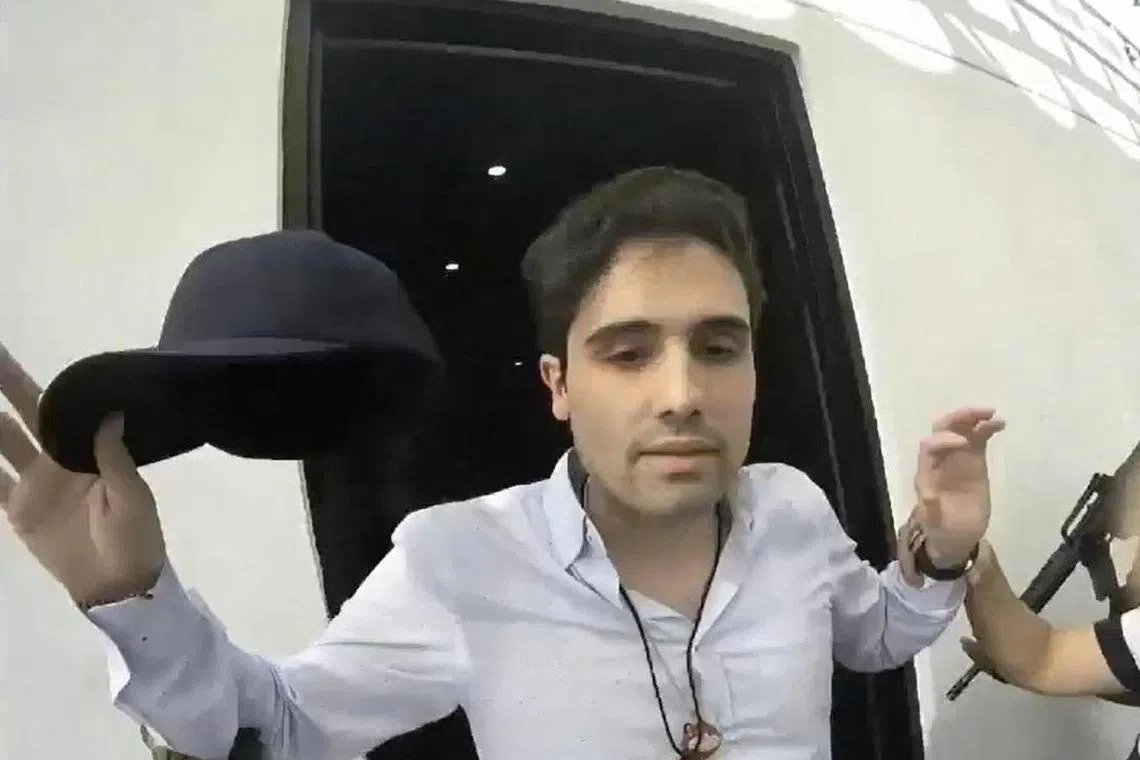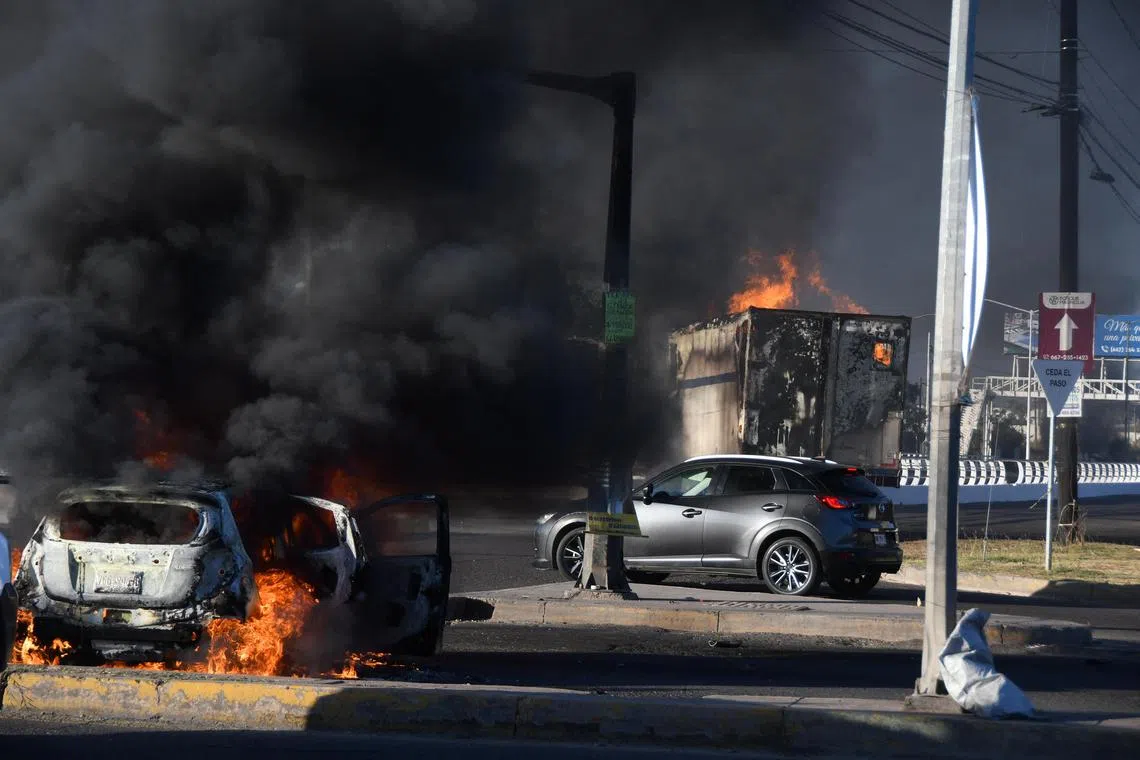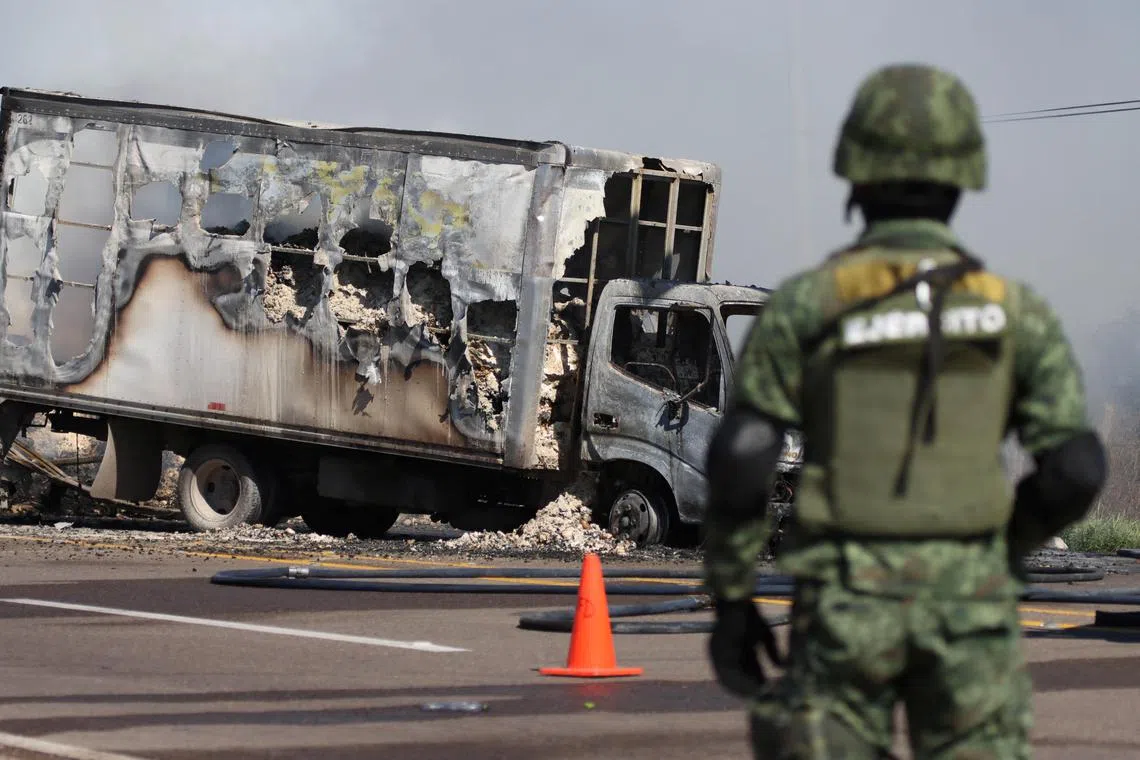Mexico arrests son of drug kingpin ‘El Chapo’, sparking wave of violence
Sign up now: Get ST's newsletters delivered to your inbox

Ovidio Guzman was briefly detained in 2019 but was quickly released to end violent retribution in Culiacan from his gang.
PHOTO: AFP
MEXICO CITY - Mexican security forces captured on Thursday drug cartel leader Ovidio Guzman, a son of jailed kingpin Joaquin “El Chapo” Guzman.
It triggered a wave of violence ahead of a visit by US President Joe Biden next week.
The violence took place largely in the city of Culiacan in the northern Sinaloa state, home to the powerful drug cartel of the same name that El Chapo headed before his extradition to the United States in 2017.
State Governor Ruben Rocha said seven members of the security forces had been killed, including a colonel, and 21 had been injured, as well as eight civilians.
Mr Rocha said there had been 12 clashes with the security forces, 25 acts of looting, and 250 vehicles had been set on fire and used to block roads.
“Tomorrow we think we will be able to work normally,” he said, adding that he had not discussed calling more reinforcements from the army or the National Guard.
An operation to detain Ovidio in 2019 ended in failure and humiliation for the government of President Andres Manuel Lopez Obrador, after the arrest triggered a wave of violence that forced authorities to shutter Culiacan’s schools and airports.
At that time, Ovidio, who has become a key figure in the cartel since the arrest of his father, was quickly released to end violent retribution from his cartel.
Defence Minister Luis Cresencio Sandoval confirmed the capture of the 32-year-old on Thursday, saying Ovidio was being held in the capital, Mexico City.
Videos shared on social media, which Reuters was unable to immediately verify, appeared to show heavy fighting overnight in Culiacan, with the sky lit up by helicopter gunfire.
The city’s airport was the target of violence, with Mexican airline Aeromexico saying one of its planes had been hit by gunfire ahead of a scheduled flight to Mexico City. No one was hurt, it said.
Mr David Tellez, a passenger who boarded the plane with his wife and three children, said they had decided to stay in the airport until it is safe to leave. “The city is worse,” he said. “There is a lot of shooting and confusion.”
A Mexican air force plane was also shot at, Mexico’s federal aviation agency said, adding that the airport in Culiacan, as well as those in the Sinaloa cities of Mazatlan and Los Mochis, would remain closed until security could be ensured.
Ovidio’s capture comes before a North American leaders’ summit in Mexico City next week, which Mr Biden will attend and at which security issues are on the agenda.
The US had offered a US$5 million (S$6.73 million) reward for information leading to the arrest or conviction of Ovidio.
It not yet clear whether Ovidio will be extradited to the US like his father, who is serving a life sentence at Colorado’s Supermax, the most secure federal prison in the country.
Foreign Minister Marcelo Ebrard said any extradition would have to follow formal processes and would not be immediate.
A surge in overdose deaths in the US, fuelled by the synthetic opioid fentanyl, has led to increased pressure on Mexico to combat the organisations – such as the Sinaloa cartel – responsible for producing and shipping the drug.
The cartel is one of the world’s most powerful narcotics trafficking organisations.
Ovidio’s arrest helps save face for Mexican law enforcement following his escape in 2019, said Mr Tomas Guevara, a security expert at the Autonomous University of Sinaloa. “The detention of Ovidio is finally the culmination of something that was planned three years ago,” he said.
It might also herald a change in approach by the government, Mr Guevara added, after criticism from many security experts that Mr Lopez Obrador was soft on the cartels, an accusation he denies.
The President argues the confrontational tactics of his predecessors were unsuccessful and only caused more bloodshed, saying he would instead pursue a strategy of “hugs not bullets”.
The security forces attempted to control the violent response to the arrest in Culiacan with heavily armed teams patrolling in pickup trucks. Burnt vehicles were scattered on the streets and heavily armed law enforcement patrolled in pickup trucks.

Burning vehicles are seen blocking a road after drug lord Ovidio Guzman’s capture, in Culiacan, on Jan 5, 2023.
PHOTO: REUTERS
“We continue to work on controlling the situation,” said Mr Cristobal Castaneda, Sinaloa’s public security chief.
Local government urged people to stay indoors and said schools and administrative offices were closed due to the violence. Street blockades had also been erected.
“We ask the citizens of Culiacan not to leave home due to the blockades that have occurred in different parts of the city,” Culiacan Mayor Juan de Dios Gamez wrote on Twitter.
Joaquin Guzman, 65, was convicted in New York in 2019 of trafficking billions of dollars worth of drugs to the US and conspiring to murder enemies.

A soldier keeps watch near the wreckage of a burnt vehicle set on fire by members of a drug gang in Culiacan, on Jan 5, 2023.
PHOTO: REUTERS
Mr Eduardo Guerrero, director of Lantia Consulting which analyses Mexican organised crime, said that recent pressure from the Biden administration to target the Sinaloa cartel had likely motivated Mexico to go after Ovidio.
But he warned that while Ovidio’s capture was likely to weaken that cartel, it could help their main rival, the notoriously violent Jalisco new generation cartel.
“It’s very important the government bear in mind that the weakening of the Sinaloa cartel may also bring about an even greater expansion, a greater presence of the Jalisco cartel. REUTERS


